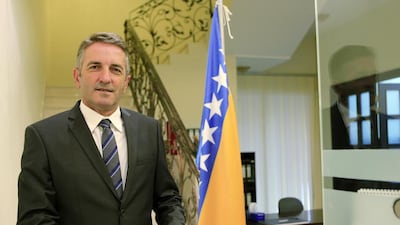ABU DHABI // Bosnia is looking to the UAE for help in building its motorways, railways and airports, its new ambassador said.
Zoran Milicevic, a former mining engineer who assumed his role last month, said Bosnia wanted to bring in investors and construction experts from the UAE to help finish 60 per cent of a major motorway project.
“We are a very small country with fewer than four million people,” Mr Milicevic said.
“We are trying to improve the country and it is getting better, but 20 years after the war it is still a bit difficult.”
Corridor 5C, which follows the European route E73 from Budapest to the port of Ploce in Croatia through Sarajevo, is one of the largest development projects in Bosnia. The country holds the longest section of the motorway, at 335 kilometres.
“It started to get rebuilt but we still need 60 to 70 per cent of it to be constructed and we are hoping the UAE or other investors can help as they have good motorways here,” Mr Milicevic said.
Railways, which have been damaged over time, will also need to be rebuilt.
“It is a fascinating idea,” said Amir Hamza Khan, corporate strategy manager at Al Manader Roads and Building Contracting in Dubai, which worked on the Dubai Metro, roads around Dragon Mart and the Atlantis Hotel.
“The UAE has a lot of expertise in this field and Dubai has been named as one of the best in infrastructure and roads.”
Mr Milicevic said Bosnia would need assistance with its airport in Sarajevo.
“Connection for people and goods is a very important matter,” he said. “We are able to provide the services for some goods like food, but if it has to be fresh, we have to organise cooling systems for cargo in the airport.
“The UAE’s knowledge and expertise in this field is extensive, they have good experience and specialists, which is what Bosnia needs.”
Both countries are also increasing their work in defence, with Bosnia’s defence minister planning a five-day visit for the Dubai airshow in a couple of weeks.
Matthew Cochran, chairman of the Defence Services Marketing Council in Abu Dhabi, said the Bosnian defence industry had evolved to a point where it could share lessons learnt during war and peace for sustainable defence support.
“This is to maintain readiness levels using its large manpower across maintenance, repair and overhaul requirements globally,” Mr Cochran said.
cmalek@thenational.ae

